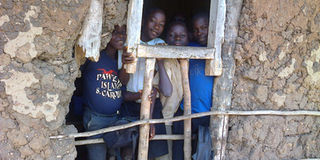Government not doing enough to improve education - report

Education decay. Pupils of St Edward Gobero Primary School in Wakiso District peep through the classroom window. MONITOR PHOTO
What you need to know:
- State minister for Primary Education Rosemary Seninde said there are funding gaps that the ministry faces which have led to some of the challenges but they are being addressed gradually.
KAMPALA. Uganda’s ambition of providing an “inclusive and equitable quality education and promote lifelong learning opportunities for all” may not be attained, warns a report tracking the implementation of Sustainable Development Goal 4 (SGD 4).
The report by Initiative for Social and Economic Rights, a non-governmental organisation, released last week in Kampala, lists poor quality of teachers, illegal fees charged by some school administrators as while as exclusion of children with disability from the education system by the nature of designs of toilets and classes without ramps, as reasons why Uganda may not be on tract to achieving the global agenda.
The report also notes government failure to provide a school per parish despite planning documents discussing the goal of “one primary school per parish and one secondary school for every sub-county.”
“Despite acknowledgement that this goal has not been met, there is no explicit reference in the Ministry of Education and Sports in the most recent three-year strategic plan or its annual performance reviews to the number and locations of the parishes and sub-counties that are lacking the promised facilities, nor is there reference to any systemic effort to resolve this shortcoming,” reads part of the report.
By last year, more than 615 sub-counties, according to ministry documents, had no secondary schools. In 2015, more than 190 countries, Uganda inclusive, committed to the 17 Sustainable Development Goals or SDGs to, among others to end extreme poverty for all, fight inequality and injustice, address climate change and provide quality education for all among others by 2030.
Education features prominently on the global agenda - SGD 4 - dictates that countries “ensure inclusive and equitable quality education and promote lifelong learning opportunities for all.”
Although Uganda offers free education to refugees, the report says its success is entirely in the hands of donors and not government.
Ministry responds
State minister for Primary Education Rosemary Seninde said there are funding gaps that the ministry faces which have led to some of the challenges but they are being addressed gradually.
She said some children are dropping out of school because of not feeding at school, some due to early pregnancies or some parents not taking children to school due to ignorance.
Ms Seninde said the ministry will allocate a budget to sensitise parents. “Quality education is a responsibility of both government and parents. The quality of education may not be the best because of the number of teachers to pupil ratio [1:60] but we are improving,” Ms Seninde said, adding: “We have built 170 Seed schools so far and 84 commissioned.”


